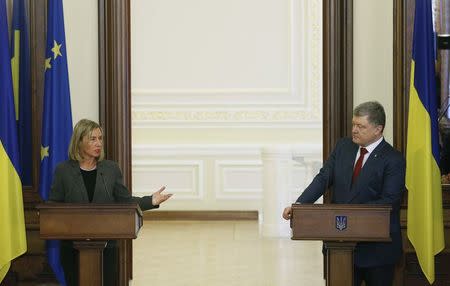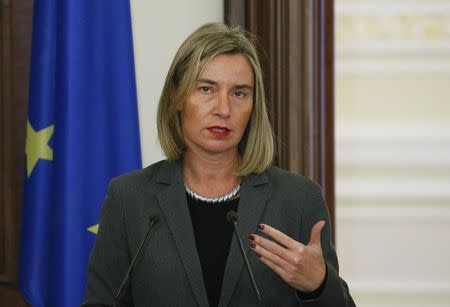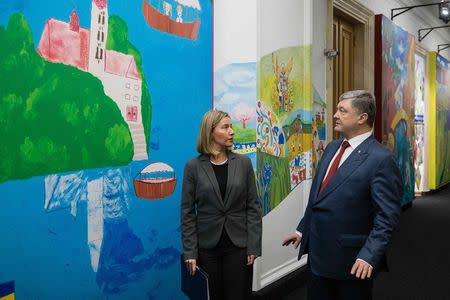EU has not tired of helping Ukraine: foreign policy chief
By Alessandra Prentice and Olena Vasina KIEV (Reuters) - The European Union's foreign policy chief Federica Mogherini said on Monday there was "no fatigue" on the part of the EU towards Ukraine, as demonstrated by its extension of sanctions on Russia and financial aid for Kiev. On a visit to Ukraine, Mogherini signaled strong support but also urged authorities to do more to fight corruption and to set up an anti-corruption court in line with the recommendations of the Venice Commission, a rights watchdog. Ukrainian President Petro Poroshenko, addressing a business forum later, expressed confidence a compromise could be found over the anti-corruption court that would satisfy both the Venice Commission and be in line with Ukrainian law. Mogherini said Ukraine had made impressive progress on key reforms but more was needed. The EU aims to disburse the first tranche of a new assistance package worth 1 billion euros ($1.23 billion) to Ukraine before the end of the year but the conditions of that aid are yet to be discussed, she said. "There is no fatigue in our support for Ukraine, also because we have seen results," Mogherini said at a press briefing with Poroshenko. The West threw its backing behind Ukraine after the 2013/2014 Maidan protests brought a pro-Western government to power, but since then critics have accused Poroshenko and the government of dragging their feet over reforms. That has given rise to talk of "Ukraine fatigue" to reflect frustration at the slow pace of change. The wrangling over the anti-corruption court law is a case in point. Ukraine must pass the law in order to qualify for more aid from the International Monetary Fund, but the Fund has expressed "serious concern" that the legislation's current draft form will not guarantee the new court's independence. The law was passed on its first reading in March. Poroshenko said the final "text of the bill will comply with the recommendations of the Venice Commission, Ukrainian legislation and the Constitution." While Mogherini was in Kiev on Monday, the European Union announced the extension for another six months of its sanctions against Russia, imposed over the annexation of Crimea and support for rebels in eastern Ukraine. Speaking alongside Mogherini, Poroshenko urged European Union countries to supply defensive weapons to Ukraine, following in the footsteps of U.S. President Donald Trump. (Writing by Matthias Williams; editing by Andrew Roche)






